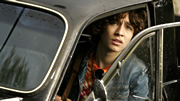“Those who search for cynicism in this film, will find nothing”
 Martin Duffy’s SUMMER OF THE FLYING SAUCER is screened in almost every European festival. It’s hard to label this bizarre science fiction story about a flying saucer falling from the sky and a boy falling in love. Like in his debut THE BOY FROM MERCURY again Martin Duffy finds a shaky balance on the edge of magic and realism. ECFA Journal spoke with Martin about his films, about ‘being different’ and about choosing projects for kids.
Martin Duffy’s SUMMER OF THE FLYING SAUCER is screened in almost every European festival. It’s hard to label this bizarre science fiction story about a flying saucer falling from the sky and a boy falling in love. Like in his debut THE BOY FROM MERCURY again Martin Duffy finds a shaky balance on the edge of magic and realism. ECFA Journal spoke with Martin about his films, about ‘being different’ and about choosing projects for kids.
Duffy: ‘It is more like the projects are choosing me. Whenever I get offered a job for grown-ups, always at the same time a scenario for youngsters ends up on my desk. Also my own scripts always dealt with childhood stories. The industry somehow labelled me: ‘That’s Martin Duffy, he is good in working with kids and in films about the sixties.’ So that’s what they ask me for.’
Ten years later, how do you look back at THE BOY FROM MERCURY?
Duffy: ‘THE BOY… was recently screened during the ‘Irish Days’ in Taipei. It was the absolute festival-hit; all screenings sold out. Nobody could explain why Taiwanese are so fond of a story about Dublin in the fifties.
I included many autobiographical elements in that script. That’s why it was so dear to my heart. The boy in the film has lost his father. Me too… when my brother died, my dad turned into a bitter, inaccessible man. THE BOY… still cuts off my breath.’
Then came THE BUMBLEBEE FLIES ANYWAY, a film far ahead of its time: a story about a boy with no memory, evolving through various levels of consciousness.
Duffy: ‘That was supposed to be my teenage ONE FLEW OVER THE CUKOO’S NEST. On DVD the film could become my biggest commercial success, simply because it has Elijah Wood in the leading role. Afterwards his career gained momentum. Although still being a young boy in THE BUMBLEBEE for the first time he was treated like a grown up actor.”
Did you grow up in circumstances somehow comparable with the world you picture in SUMMER OF THE FLYING SAUCER?
Duffy: ‘I’m from Dublin; I’m a city boy. But that era for sure was mine. In Ireland we only had showbands, Nat King Cole and Elvis. I was the first one in the family to buy a Beatles record. Suddenly a whole different sound was coming from the record player in the Duffy’s living room. I still remember how much my father hated ‘Sergeant Pepper’.
In Ireland it was always difficult to be ‘different’. There was this neighbour’s boy, 10 years older than me. He was even dating my sister for a while. But for some strange reason Georgie never seemed able to find his true love. He kept living with his parents. Only after they died, Georgie could come out of the closet. All those years he kept his homosexuality a secret. It took until the eighties before you could be ‘different’ in Ireland.’
 SUMMER OF THE FLYING SAUCER was shot in Ireland?
SUMMER OF THE FLYING SAUCER was shot in Ireland?
Duffy: ‘We found a godforsaken village in Galway (Western Ireland) that seemed to have escaped from the modern times. At first we couldn’t find it on the map. Celtic Ireland was kept very much alive and intact in that place.’
In those years, the Church and its representatives played a very important role in the village’s life. That shows in SUMMER OF…
Duffy: ‘I’m not catholic but I liked the surprising idea of a priest choosing side for the ‘intruders’. The priest himself is an outsider who hasn’t won the villagers’ confidence yet. He carries some of the new spirit of the sixties with him to the village.’
How did you maintain balance between the absurdity of the story and the serious elements it carries within?
Duffy: ‘Humour was the most important element. It’s a pure feel good movie. I didn’t want a single bit of cynicism in the film. Maybe not everyone appreciates that choice – the comments were as well praising as … – but whoever searches for cynicism in this film, will find nothing at all. That’s my nature; I don’t know if it’s a blessing or a curse.’
An a) and a b)-question. Choose which one you want:
What’s your opinion about flying saucers?
When you first kissed, did it feel as if you were kissing an alien?
Duffy: ‘My first kiss was not with an alien. But I do remember the excitement… It was with a beautiful girl who later on became my wife. About flying saucers: I’m 100 % sure they exist. It’s not just a presumption; I’ve seen one myself. On a clear night I saw a lighting object making movements that couldn’t possibly be performed by planes nor satellites…’
About the special effects… STAR WARS it isn’t.
Duffy: ‘That’s a tricky topic. I wasn’t involved in the post-production. The producers turned so desperate that they simply fired everyone, including the editor. The people finishing the job didn’t do their best. It irritates me enormously. Too little time, too little equipment…. So you end up in a sort of Ed Wood-zone. While I saw that movie as ‘THE QUIET MAN meets ET’.’
Both aliens look absolutely unreal.
Duffy: ‘My first choice for that role was Dolph Lundgren. He thought it was a funny idea but he wasn’t available. So I introduced the German actor Jens Winter, whom indeed looks rather ‘extreme’. Jens is a good friend, and so are Dan Colley (the pub owner), Hugh O’Conor (the priest) and Seamus Deasy (D.O.P.). The atmosphere on the set was absolutely friendly.’
Just like THE BOY FROM MERCURY, SUMMER OF… contains a scene in a small local movie theatre. Was that an important part of your childhood?
Duffy: ‘Absolutely! Those were the early days of Irish television, only broadcasting from 6 – 10 PM and of course nothing for kids. Saturday afternoon was the week’s apotheosis. You could even pay your ticket with empty bottles to collect. On the way home you played cowboys and Indians with your friends.’
Was that clip in the movie theatre an extract from a real film?
Duffy: ‘I wanted to use the trailer of THE DAY THE EARTH STOOD STILL, but they didn’t let me. So we hired a team: a bunch of friends recorded a pastiche over one weekend, beforehand we discussed all the details: the content, the dialogues, the looks,… ’
The film is a farewell to an unspoiled youth. That makes it a bit sad.
Duffy: ‘That’s why I love the last shot from Danny, while the bus is taking him away from the village. You can read hope on his face. At the dawn of a new period in his life, you simply know things will work out well for Danny.’
Nowadays you live and work in Berlin. How are things going for Irish children’s film?
Duffy: ‘Not much has been produced; the national film board is not exactly supporting family films. Recently a magazine published a list of 50 recent Irish films, lined up on one side in order of box office results. THE BOY… was all down at the bottom. The other side lined up the amount of spectators on television. There it was amongst the top 5. It was the only film showing such a distinction. Bizarre… people love watching children’s films from their own country, but they’re not willing to see them in the cinema. Soon the same might happen to SUMMER OF THE FLYING SAUCER.’
Gert Hermans
